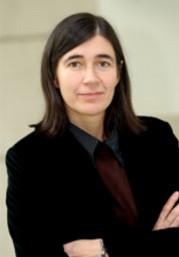Dr. María A. Blasco
María A. Blasco, Ph.D. is the Director of the prestigious Spanish National Cancer Research Institute, headquartered in Madrid, as well as directing the Molecular Oncology Program and Telomeres and Telomerase Group. She also serves on the Research Advisory Board of the SENS Foundation.
María’s research in telomeres and telomerase began at Cold Spring Harbor Laboratory (New York) where she joined C.W. Greider (Nobel Prize 2009) as a Postdoctoral Fellow. Back in Spain, first at the Spanish National Biotechnology Centre and then at the Spanish National Cancer Research Centre, her research team continued to make key contributions to the telomere and telomerase field, including first demonstration of the ant-aging activity of telomerase, the discovery of telomeric RNA’s and the importance of telomerase activity and telomere rejuvenation during nuclear reprogramming.
Her team has also made important technological advances by developing highly sensitive high throughput techniques to measure telomere length as well as the presence of very short telomeres in blood samples and tissue samples.
María has received the Swiss Bridge Award for Research in Cancer, the Josef Steiner Cancer Research Award, the EMBO Gold Medal, the Carmen and Severo Ochoa Foundation Award for Molecular Biology, the Rey Jaime I Basic Research Award, the Körber European Science Award, the Alberto Sols Award in Biomedical Research, and the National Award on Biology “Ramon y Cajal”. She serves on the Editorial Board of several scientific journals and has been an elected EMBO Member since 2000 and a Member of the Academia Europaea since 2006. She was appointed to EMBO Council in 2008.
She has authored more than 130 original papers and made major contributions to the field of telomeres and telomerase and the role they play in aging, cancer, and stem cell biology. Her papers include Disease states associated with telomerase deficiency appear earlier in mice with short telomeres, Mammalian Ku86 protein prevents telomeric fusions independently of the length of TTAGGG repeats and the G-strand overhang, Telomerase-deficient mice with short telomeres are resistant to skin tumorigenesis, and Epigenetic regulation of telomere length in mammalian cells by the Suv39h1 and Suv39h2 histone methyltransferases.
Read Interview with María A. Blasco and CNIO scientists successfully test the first gene therapy against aging-associated decline. Watch Científicos de frontera — María Blasco.
